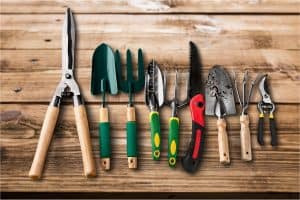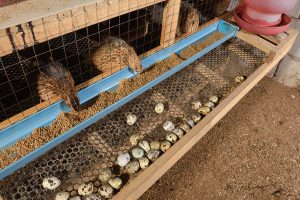City life is not for everyone. If you’re the type of person that craves the outdoors, fresh air, and peace and quiet, then you may be wondering how to start homesteading. Well, wonder no more! Starting a homestead is easier than you think, and can be a great way to get back to nature. Read further and learn more about what homesteading is, the benefits of doing it, and how to get started.

What Is Homesteading?
Homesteading is a lifestyle that involves living off the land and becoming self-sufficient. It’s about using natural resources to produce food, shelter, and fuel, as well as utilizing crafts and skills to create goods and services.
When most people think of homesteading, they picture pioneers in the 1800s settling down on a small piece of land and starting from scratch. But homesteading is not just a thing of the past. It’s a way to simplify your life, reduce your environmental impact, and connect with nature.
Nowadays, a homesteader is often looked at as someone who lives on the farm or even off-grid. But you don’t have to go that far. You can start homesteading right in your own backyard or on a small piece of land. You can also be considered a homesteader even if you live in the city as long as you grow your own food, recycle, compost, use natural remedies, generate your own energy, and do other practices that contribute to your self-sufficiency.
Why Should You Start Homesteading?
There are many reasons why you should start homesteading. Here are some of the benefits:
1. You save money
One of the biggest benefits of homesteading is that you save money. It’s no secret that growing your own food is cheaper than buying from the grocery store or eating at a restaurant. When you grow your own vegetables, herbs, fruit trees, and other crops, you don’t have to buy produce. When you raise your own animals, you don’t have to buy meat, eggs, and milk.
Such products cost a lot when you buy them from stores since the markup price covers overhead expenses like shipping, packaging, advertising, tax, and profit. There’s no need to ship, pack, and advertise the food that you grow and raise on your own unless you want to sell them yourself.
Using renewable energy sources, such as solar panels and wind turbines, can reduce your electricity bill. You can also save money on your water bill by digging a well or collecting rainwater.
2. You know where your food comes from
When you grow your own food, you know exactly where it came from. You don’t have to wonder if what you’re putting in your mouth contains any pesticides, herbicides, and other chemicals that commercial farms usually use to grow their crops and raise their animals.
You know the soil it was grown in, the water it was irrigated with, and how it was treated. You also know who grew it and how they grew it. This’s not always the case when you buy food from stores. Once you start homesteading, you can be sure that the food you eat is a lot safer and healthier than store-bought ones.
You can also choose to grow heirloom varieties of fruits and vegetables, which are not available in grocery stores. Heirloom crops are more nutritious than commercial varieties.
3. You get to be self-sufficient
Self-sufficiency is the ultimate goal of homesteading. This means that you don’t have to rely on anyone else for your food, water, shelter, and other needs. You can provide all of these things for yourself and your family by using the land that you own or lease.

4. It’s good for the environment
One good reason to start homesteading is that you’re helping Mother Earth. When you produce your own food and energy, you’re reducing the amount of pollution that’s released into the atmosphere. Carbon footprint is lessened since there’s no more need to transport the goods to faraway places. The use of packaging materials that add to the world’s trash is also decreased. That means you’re also doing your part to help preserve the environment for future generations.
5. It’s good for your health
Homesteading is a great way to get healthy. Aside from planting healthier varieties of crops, you’ll also be getting plenty of exercise from working in the garden and tending to your animals.
You’ll also be eating fresh, organic produce that’s free of pesticides and other harmful chemicals. And since you’ll be growing your own food, you’ll know exactly what’s in it!
6. You get to spend time outside
Homesteading requires some time outdoors and under the sun. Gardening and raising animals are both great ways to get some Vitamin D, a bit of exercise, and an opportunity to enjoy and connect with nature. This is something many who’ve had enough of the pollution and craziness of urban living wish for.
7. You get to know your neighbors
Being a homesteader gives you a chance to get to know other homesteaders and your neighbors. You can share the food you’ve grown or other products you’ve made with people in the neighborhood, which is a great opportunity to get to know them. You also get to trade stories, tips, and recipes with them. Homesteading is a great way to become part of a community of like-minded people.

How to Get Started with Homesteading
Truth be told, homesteading is not for everyone. If you can’t see yourself living without the convenience of big-box stores, or having to drive an hour just to get groceries, then homesteading is probably not for you. However, if you’re looking for a way to get back to basics, and really learn about self-reliance, then homesteading is definitely worth considering.
Homesteading is possible as long as you have the right mindset and are willing to put in the work. It takes a lot of hard work, dedication, and passion to be a successful homesteader. Here are twelve things you need to do to start a homestead:
1. Set a goal
One of the most important things you can do when starting a homestead is to set a goal. What do you want to achieve with your homestead? Do you want to be self-sufficient? Do you want to provide all of your own food? These are just some examples, so be sure to tailor your goal to fit your own needs and wants.
2. Do your research
Homesteading is not a one size fits all activity and there is a lot of information out there on what works best for different people in different climates and regions. Make sure to do your research and familiarize yourself with the basics of homesteading before you get started – this includes things like gardening, raising livestock, and sustainable living. There are plenty of resources online and in libraries, and experienced homesteaders are always happy to share their tips.
3. Create a budget and stick to it
Like anything else, when starting a homestead you need to set a budget and stick to it. Learning how to live within your means is one of the biggest challenges of homesteading so you need to keep your expenses in check.
You should first figure out how much money you’ll need to get started, as well as how much it will cost to maintain your homestead each year. Be realistic about what you can afford and be prepared to make some sacrifices in order to stay on budget.
4. Find the right property
One of the goals of those who go into homesteading is to have their own property where they can live and start their journey to self-sustainability. When looking for land to start your homestead, there are a few things you’ll want to keep in mind.
First, be sure to find a property that is zoned for agricultural use – this will make it easier to get started. It’s also important to find a property that has access to fresh water and is relatively flat, as this will make it easier to build your home and infrastructure.
Also, you should consider its proximity to the hospital, school, and other necessary services. If you’re not able to live on the property full-time, you may want a homestead that’s near your hometown or city.
5. Get to know your land
One of the keys to success with homesteading is getting to know your land. Take the time to walk around your property and learn about the different areas. Figure out what crops and animals you can farm on your land. Know where the best place to plant your garden would be or where you should put your chicken coop.
6. Gather the necessary supplies and tools
Before you can start homesteading, you need to know what supplies and tools you will need. This includes things like gardening tools, farming tools, animal husbandry tools, etc. You’ll also need power tools to build structures on your farm. You should also invest in a good set of books on homesteading. There are many good books on the subject that can teach you everything you need to know about homesteading.

7. Build your infrastructure
One of the best ways to become a successful homesteader is to start building things. This includes things like your home, barns, fences, sheds, and even a windmill. Be sure to build everything according to code and make sure that everything is up to par with safety standards. This can be a daunting task, but it’s important to remember that you don’t need to have a lot of money or experience to do it yourself. Also, building things yourself also gives you a sense of accomplishment and makes you feel more connected to your land.

8. Start gardening
One of the most important aspects of homesteading is gardening. Not only does it provide you with fresh produce, but it’s also a great way to connect with nature. When starting a garden, be sure to do your research on what types of plants will grow best in your climate and region. Plan out your garden properly so that you can make the most of the space you have.

9. Raise livestock
Many people who homestead also raise livestock. This can include cows, pigs, chickens, goats, and more. When choosing which animals to raise, be sure to do your research on what will work best for you and your property. Remember that each animal has different needs, so you’ll need to be prepared to care for them properly.
10. Learn about food preservation
Food preservation is another aspect of homesteading that’s important to know. There are many different methods of preserving food, and you will want to learn about as many of them as possible. This way, you can keep your food stockpile full all year long.
There are two main ways to preserve food: dehydration and canning. Dehydration is the process of removing moisture from food. This can be done by using a dehydrator, an oven, or the sun. Canning is the process of sealing food in jars and heating it to a high temperature. This kills any bacteria that may be present and prevents the food from rotting.
11. Learn new skills
Homesteading allows you to learn new skills. This includes things like the aforementioned gardening, animal husbandry, food preservation, and carpentry. Other skills you can develop that’ll be useful as a homesteader include fishing, foraging, blacksmithing, and sewing. You should also learn how to do house and vehicle repairs since you’d want to be more self-reliant.

Some skills that you can use to earn extra bucks include woodworking, soap-making, candle-making, and brewing. The more skills you have, the more self-sufficient you’ll be. And, the more self-sufficient you are, the easier it will be to successfully homestead.

12. Connect with other homesteaders
Get involved in the community. Even if one of your reasons for starting this homesteading journey is to get away from the rat race, it’s still important to have a support system. You don’t have to do things on your own. There are many people out there who are also interested in homesteading and are more than happy to share their knowledge with you.
Get friendly with your neighbors, especially fellow farmers. The local store that sells farm supplies and similar products is a good place to start. You can also find fellow homesteaders by joining online forums or attending workshops and conferences. This can be a great way to learn from their experience and get help with any problems you may be having.

Tips to Know Before You Start Homesteading
There are many things you need to know before starting homesteading. here are some more tips to help you out:
1. Start small
Some people sell everything they have to start a homestead. While there are success stories, not everyone who tried this method was successful. Many may have struggled before finally giving up. Surely, there are some who had it rough at the getgo but eventually succeeded. It’s better to start small and add on as you go.
Don’t try to do too much at once. Start small and gradually increase your production as you get more comfortable with homesteading. Trying to do too much can be overwhelming and may lead to failure.
If you can’t purchase a large enough property to turn into your homestead yet, you can use your backyard. Start an edible garden by simply planting a variety of vegetables, herbs, and fruits in your garden and start harvesting your own food.

If possible, raise some small animals, too. You can set up a chicken coop in your backyard and raise a few of these birds. Quails are also good options for small backyards. They don’t take up much space and you can get around a dozen of them in a small coop. You can even keep a small goat and other livestock that can provide you with milk, eggs, meat, and other animal products. These will be good training for when you can finally move into a homestead.

2. Be patient
It takes time to get good at homesteading, so be patient and don’t expect to become a master overnight. It takes practice, trial and error, and plenty of learning from your mistakes. Be prepared to make some mistakes along the way – that’s part of the learning process!
3. Be flexible
The best thing about homesteading is that it’s flexible – you can tailor it to fit your own needs and lifestyle. If you don’t want to raise livestock, that’s okay – there are plenty of other things you can do. Likewise, if you want to focus on gardening, that’s great too. Homesteading is what you make it, so be flexible and explore different aspects of it until you find something that works for you.
4. Have fun!
Homesteading can be a lot of work, but it should also be enjoyable. Find ways to make it fun and enjoy the process of learning about self-reliance. Try new things, ask questions, and experiment – after all, that’s how you learn!

As you probably surmised from what you just read, it’s not that easy to start homesteading. Still, it’s not completely impossible. Plus, it’s well worth the effort! Visit Gentleman Pirate Club if you wish to learn more about homesteading and other tips to become more self-sufficient.
Just a disclaimer – We have partnered with these companies because we use their products and/or proudly trust and endorse them – so we do receive a commission if you make a purchase or sign up for services. Often, we are able to negotiate special discounts and/or bonuses, which we will pass on to you via our links. We often get short notice on sale items available for 24-48 hours as we will pass these savings on to you.























